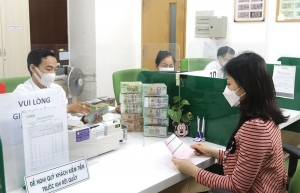Central bank issues policies to support businesses
 |
| A residential area in Hanoi (Photo: VNA) |
Hanoi - The State Bank of Vietnam (SBV) has recently issued two circulars to support businesses and the real estate market in particular.
The central bank on April 24 issued Circular No 02/2023/TT-NHNN that provides instructions for banks on debt rescheduling and retention of debt categories to assist borrowers of business and consumer loans. Under the circular, banks are permitted to defer borrowers’ debts until June 30, 2024.
According to the SBV, the move is aimed to implement the directive of the Government in Resolution No 50/NQ-CP 2023 and Resolution No 59/NQ-CP 2023.
According to the circular, a bank will consider rescheduling principal and/or debt interests on the basis of borrowers’ requests, the financial capacity of the bank and compliance with the following regulations.
First, debts that are rescheduled and have debt categories retained are principal of loans granted before April 24, 2023, and from lending and finance lease.
Besides, the principal and/or interest have to be paid within the period from April 24, 2023 to June 30, 2024 and rescheduling time will be decided by the banks and will not exceed 12 months from the due date of the outstanding debt to be rescheduled.
The debt rescheduling according to Circular No 02/2023/TT-NHNN will be implemented from April 24, 2023 to June 30, 2024, and the SBV authorises banks to proactively consider, assess borrowers' difficulties, and decide on the rescheduling of their debts.
According to the SBV, the policy on the rescheduling of debt payment and debt category retention according to Circular No 02/2023/TT-NHNN prolongs the bank loan deferral periods that will directly contribute to partly removing difficulties of people and enterprises.
The policy also enables enterprises and people to continue to reinvest and obtain new business loans and consumer loans, thereby contributing to the development of production and promoting economic development according to the Government’s set objectives of 2023 and the whole 2021-25 period.
Analysts from Viet Capital Securities Company (VCSC) said Circular 02 is based on the debt restructuring mechanism that was used and demonstrated efficiency during the COVID-19 pandemic.
“Circular 02 aims to support all sectors of the economy as customers who are facing difficulties can obtain access to other bank loans to maintain their normal business. However, we think the real estate sector could be one of the biggest beneficiaries as it now has tools to spread out difficulties over several years to resolve issues, which will help to avoid the collapse of companies - especially real estate developers - that could lead to systematic risk. As for banks, the ease on pressure for customers - especially real estate developers - will also help to ease the pressure on banks, which could lead to lower credit costs,” the analyst said in a recent report.
VNDirect Securities Company (VDSC) also said Circular 02 has a positive impact on both businesses and banks. Thanks to the circular, the pressure of provisioning will be minimised when the restructured debts are provisioned in two years of 2023 and 2024.
The circular will positively influence the investors’ sentiment towards banks, such as Techcombank, Military Bank, VPBank and HDBank, which have a high proportion of real estate and consumer loans in their credit structure.
On the same day, the SBV also promulgated Circular No 03/2023/TT-NHNN suspending the validity of Clause 11, Article 4 of Circular No 16/2021/TT-NHNN on corporate bond trading of credit institutions and foreign bank branches from April 24, 2023 to December 31, 2023.
Experts said the corporate bond market will be partially eased as Circular 03 continually allows banks to buy unlisted corporate bonds.
The circular will allow banks to actively and flexibly buy back bonds from inpidual investors, which will help increase market liquidity, reduce bond maturity pressure and increase the market-making role of banks, the experts said.
Nguyen Quang Thuan, chairman of financial data provider FiinGroup, said the new regulation makes the most sense for banks in the context that the pressure to buy back bonds has recently increased when investors have requested to pay off before maturity.
The regulation will remove the pressure that some banks are facing because they distributed the bonds to investors while the bond’s issuer faces difficulties in cash flow and cannot redeem.
However, Le Hoang Chau, Chairman of HCM City Real Estate Association, said that Circular 03 still does not allow banks to buy corporate bonds that firms issue to reverse debts.
In addition, the suspension period of the regulation is only eight months which is too short and not enough for the corporate bond market to overcome difficulties, Chau said.
Therefore, Chau proposed the SBV to continue to abolish the regulation that prohibits banks from buying corporate bonds issued with the aim of restructuring the issuer’s debts.
 | Central bank pushes for rule alignments The State Bank of Vietnam last week sought amendments and supplements to rules relating to the purchase of shares in Vietnamese credit institutions by foreign investors. |
 | Confusion compounded by consumer finance apps Consumer finance companies in Vietnam are facing significant challenges due to negative aggressive debt collection practices and unlicensed debt trading applications. |
 | Lenders to benefit in SBV debt reposition The State Bank of Vietnam’s fresh set of policies are anticipated to ameliorate the financial strain faced by both creditors and debtors, as well as establish a robust legal framework for debt restructuring to be allocated over a two-year period. |
What the stars mean:
★ Poor ★ ★ Promising ★★★ Good ★★★★ Very good ★★★★★ Exceptional
Related Contents
Latest News
More News
- State corporations poised to drive 2026 growth (February 03, 2026 | 13:58)
- Why high-tech talent will define Vietnam’s growth (February 02, 2026 | 10:47)
- FMCG resilience amid varying storms (February 02, 2026 | 10:00)
- Customs reforms strengthen business confidence, support trade growth (February 01, 2026 | 08:20)
- Vietnam and US to launch sixth trade negotiation round (January 30, 2026 | 15:19)
- Digital publishing emerges as key growth driver in Vietnam (January 30, 2026 | 10:59)
- EVN signs key contract for Tri An hydropower expansion (January 30, 2026 | 10:57)
- Vietnam to lead trade growth in ASEAN (January 29, 2026 | 15:08)
- Carlsberg Vietnam delivers Lunar New Year support in central region (January 28, 2026 | 17:19)
- TikTok penalised $35,000 in Vietnam for consumer protection violations (January 28, 2026 | 17:15)

 Tag:
Tag:




















 Mobile Version
Mobile Version